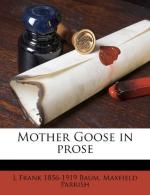“Nonsense!” said the Squire; “because you named the flowers after your brother Hobart is no reason he should be affected by the fading of the dingle-bells. I very much suspect the real reason they are dying is because the cold sea wind caught them last night. Dingle-bells are delicate. If you had scattered the cockle-shells and cowslips all about them, the stronger plants would have protected the weaker; but you see, my girl, you planted the dingle-bells all in a row, and so the wind caught them nicely.”
Again Mary reproached herself for having been contrary and refusing to listen to her mother’s advice; but the Squire’s words comforted her, nevertheless, and made her feel that brother Hobart and the flowers had really nothing to do with each other.
The weather now began to change, and the cold sea winds blew each night over Mary’s garden. She did not know this, for she was always lying snugly tucked up in her bed, and the warm morning sun usually drove away the winds; but her mother knew it, and feared Mary’s garden would suffer.
One day Mary came into the house where her mother was at work and said, gleefully,
“Papa and my brothers will soon be home now.”
“Why do you think so?” asked her mother.
“Because the cockle-shells and cowslips are both fading away and dying, just as the dingle-bells did, and papa said when they faded and withered he and the boys would come back to us.”
Mary’s mother knew that the harsh winds had killed the flowers before their time, but she did not like to disappoint her darling, so she only said, with a sigh,
“I hope you are right, Mary, for we both shall be glad to welcome our dear ones home again.”
But soon afterward the big bluff Squire came riding up, as was his wont, to where Mary stood by her garden, and he at once asked,
“Pray tell me, dear,
though much I fear
The answer sad I know,
How grow the sturdy cockle-shells
And cowslips, all in a row?”
And Mary looked up at him with her bright smile and answered,
“Dingle-bells and cockle-shells
And cowslips are all dead,
And now my papa’s coming
home,
For so he surely said.”
“Ah,” said the Squire, looking at her curiously, “I ’m afraid you are getting way ahead of time. See here, Mary, how would you like a little ride with me on my nag?”
“I would like it very much, sir,” replied Mary.
“Then reach up your hand. Now!—there you are, little one!” and Mary found herself seated safely in front of the Squire, who clasped her with one strong arm so that she could not slip off.
“Now, then,” he said “we ’ll take a little ride down the hill and by the path that runs beside the wood.”
So he gave the rein to his mare and they rode along, chatting merrily together, till they came to the wood. Then said the Squire,




